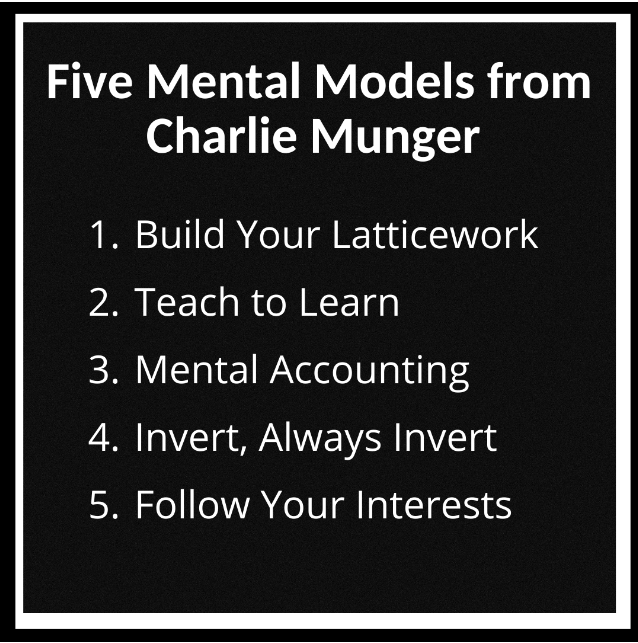Five Mental Models from Charlie Munger | Vol. 84
“Without models from multiple disciplines, you will fail in business and in life.”
– Charlie Munger
Many years ago, I stumbled upon a PDF of Charlie Munger’s famous 1994 speech at USC. In it, he championed the idea that with 80 to 90 timeless mental models you could better navigate the world. This inspired me to create a list of models I believed mattered in early 2018. I often draw from that document for these articles. Almost six years since I began, I’ve assembled exactly 80 mental models. Many were learned through costly mistakes I’d rather not repeat.
Charlie Munger passed away just shy of his 100th birthday on November 28, 2023. Today, I’d like to share five of my favorite mental models that he inspired.

- Build Your Latticework – The first and most important idea is collecting and internalizing models. As Munger said, “The first rule is that you can’t really know anything if you just remember isolated facts and try and bang ’em back. If the facts don’t hang together on a latticework of theory, you don’t have them in a usable form … You’ve got to hang experience on a latticework of models in your head.”
- Teach to Learn – Munger referred to this model as the “Orangutan Effect” which I covered in an earlier TwentyPercenter post. He noted, “If you sit down with an orangutan and carefully explain to it one of your cherished ideas, you may leave behind a puzzled primate, but will yourself exit thinking more clearly.” Ironically, no one learns more than a teacher.
- Mental Accounting – Munger explained the idea that how we make money informs how we value it. He described how gamblers would go to a casino with $100, win, and have $500 in chips, but keep playing until they left with $300. Most would say they made $200. Munger was clear that they had lost $200. Just because they were playing with house money, didn’t make that money not real. They could have left with $500. I remind myself and others of this model whenever I find myself with an unexpected windfall, like a tax refund or a bonus.
- Invert, Always Invert – One of Munger’s most famous sayings is “All I want to know is where I’m going to die, so I’ll never go there.” Many use that quote to illustrate this point. I prefer his reply at a Berkshire Hathaway annual stockholder gathering where he shared this lesson from his days as a WWII meteorologist: “When I was a meteorologist in World War II, they told me how to draw weather maps and predict the weather. What I was actually doing was clearing pilots to take flights. And just reverse the problem.
I inverted. I said: ‘Suppose I want to kill a lot of pilots. What would be the easy way to do it?’ And I concluded that the only way to do it was to get the planes into icing the planes couldn’t handle or to get the pilot into a place where he’d run off fuel before he could safely land.
So I made up my mind, I was going to stay miles away from killing pilots by either icing or getting them sucked into conditions where they couldn’t land.”
Inverting the problem doesn’t always produce the solution but it almost always highlights the biggest mistakes to avoid - Follow Your Interests – “Another thing that I found is an intense interest of the subject is indispensable if you are really going to excel,” Munger shared. “I could force myself to be fairly good in a lot of things, but I couldn’t be really good in anything where I didn’t have an intense interest.” Mastery doesn’t come easily. If you’re serious about getting great at something, start with something that interests you intensely.
Honestly, I could list many more. If this has piqued your curiosity, I highly recommend Shane Parrish’s book, The Great Mental Models Volume 1: General Thinking Concepts. If you have a great Munger quote or model you love, feel free to reply back and share.
One question to ponder in your thinking time: How can I collect the lessons I’ve learned such that I don’t repeat my worst mistakes?
Make an Impact!
Jay Papasan
Co-author of The One Thing & The Millionaire Real Estate Agent

Leave a Reply
You must be logged in to post a comment.